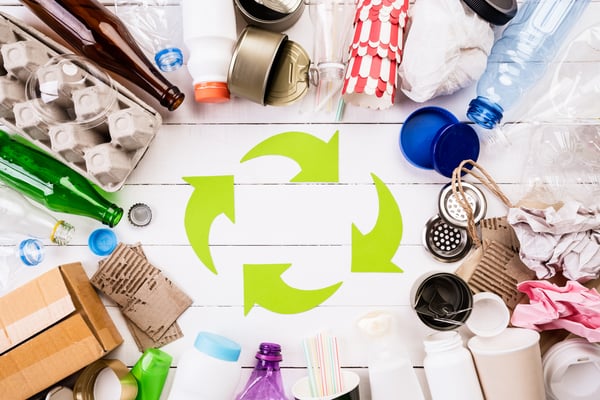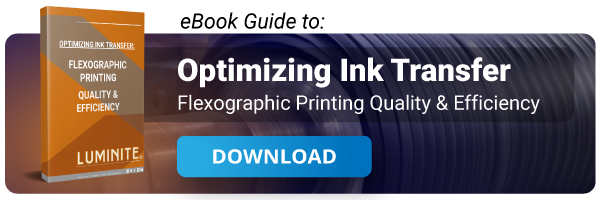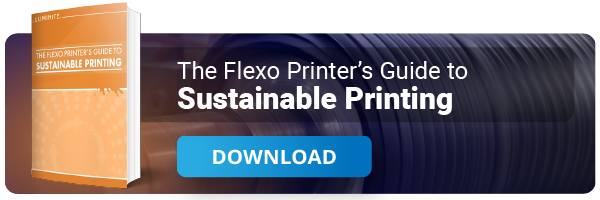Share this
Sustainable Packaging Design Guide for Newcomers
by Luminite on Jul 12, 2021 1:00:00 PM

You've likely seen news coverage of plastic packaging floating on the surface of the world's oceans. Experts predict that there will be more plastic than fish in the seas by the year 2050.
Pollution is a driving force behind the sustainable packaging movement. Consumers are demanding green packaging solutions now more than ever and it's up to the packaging industry to deliver.
Here's what you need to know about sustainable packaging design:
What is Sustainable Packaging Design?
Let's quickly review the essentials of sustainable packaging. According to the Sustainable Packaging Alliance, or SPA, a package that is considered "sustainable" must meet the following requirements:
- Effective: Provides value and supports responsible decision making.
- Efficient: Uses and maximizes green packaging materials.
- Cyclic: Uses eco-friendly packaging materials, technologies, and inks.
- Safe: The package poses no harm to human health or the environment.
The Role of Sustainable Package Design
Green sustainable packaging all starts with environmentally friendly packaging design. Eco friendly packaging uses only the minimum amount of resources necessary, and always uses either renewable or recycled materials when appropriate.
But packaging design is more than using the right materials -- it should also consider a package's environmental impact. What happens once the candy has been eaten or the shampoo has been all used up? Are the raw materials of the package easily recyclable or biodegradable?
If you're serious about reducing packaging waste, It’s important to consider these packaging materials and options:
- Printing inks
- Coatings
- Glue / Adhesives
- Secondary or protective packaging
You should be evaluating every single aspect of your package design to eliminate inefficiencies.
The Role of Sustainable Packaging Inks
You can break packaging raw materials down into two groups.
- The substrate: cardboard boxes, plastic, foil, etc.
- The inks, coatings, and adhesives that help it stand out on a store shelf
Having Eco friendly packaging practices doesn’t stop once the packaging container is structurally sound. Next comes printing, where a product really comes into its full, colorful design.
Flexographic printing is able to print high-definition images with water-based inks, which are more eco-friendly than solvent-based ones. Flexo printers may need to adjust their equipment to adequately print with water-based inks, but the payoff is certainly worth it for those looking for a well-rounded sustainable packaging strategy.
There are also plenty of eco-friendly coatings and adhesives to incorporate into your sustainable packaging strategy. When printing flexo, you can invest in durable image carriers that are able to serve a variety of applications including laying down adhesive in addition to traditional printing and ink transfer.
Packaging Materials Matter
We can't downplay the importance of using the right materials for your packaging. When it comes to the most sustainable packaging materials, you have a surprising number of options.
While paper and corrugated board are perhaps the best sustainable packaging examples for their recycling benefits, new materials are being developed with similar benefits. Many people point to plastic flexible packaging as a key culprit of packaging waste. However, it's important to note that more and more modern packaging films are recyclable at store drop-off locations.
Some plastic films are even compostable or biodegradable to reduce their strain on the environment. Plastic films may not yet be a widely accepted technology, especially compared to corrugated board and paper, but advances in plastic packaging have made them less of a target for environmentalists.
Packaging Design is Key
Ultimately, sustainable packaging design determines the life cycle of a product’s packaging. Ideally, packages should be able to support multiple uses -- reduce, reuse, recycle, right?
Consider sustainable food packaging. Above all else, it needs to keep products fresh and reduce the risk of contamination and premature spoilage. Why not design packaging that can be used multiple times? That’s why things like durable paper shopping bags are popular; unlike plastic bags, they can be used for numerous trips to the grocery store.
From a sustainability standpoint, single-use packaging doesn't maximize the resources used. Put the extra resources and design time into making a packaging that not only does its job, but also lends itself easily to reuse or recycling.
Sustainable Printing Practices for Sustainable Packaging
Designing and executing sustainable packaging goals is a big step for companies in the fight against pollution and waste. But just as important are sustainable printing practices.
For flexographic printing, elastomer sleeves reduce waste, cost, and setup time compared to outdated methods. Using water-based inks also lowers the emissions of volatile organic compounds.
Want to learn more about how to refine your printing processes to make them more sustainable? Check out our guide to sustainable printing!
Editor's Note: This blog post was originally published in June 2020 and was updated July, 2021.”
Share this
- Flexographic Printing (81)
- Image Carrier (28)
- Elastomer sleeves (27)
- Ink Transfer (25)
- Quality (22)
- Flexo sleeve (20)
- News (18)
- printing defects (18)
- flexo printing defects (17)
- sustainability (13)
- Flexo Troubleshooting (12)
- Ink (12)
- Digital Printing (10)
- Flexo 101 (10)
- Flexo Inks, (9)
- Anilox (7)
- Blister Packaging (7)
- Cost (6)
- print misregistration (6)
- regulations (6)
- Corrugated Printing (4)
- pinholing (4)
- "Tradeshow (3)
- Digital Flexo (3)
- Gravure Printing (3)
- Insider (3)
- Load-N-Lok (3)
- Wide Web (3)
- direct laser engraving (3)
- flexo-equipment-accessories (3)
- gear marks (3)
- halo (3)
- testing (3)
- Narrow Web (2)
- bridging (2)
- feathering (2)
- filling in (2)
- mottled image (2)
- pressure (2)
- Labelexpo (1)
- dirty prints (1)
- doughnuts (1)
- embossing (1)
- kiss impression (1)
- October 2023 (2)
- September 2023 (1)
- August 2023 (1)
- July 2023 (3)
- June 2023 (1)
- May 2023 (5)
- April 2023 (1)
- March 2023 (2)
- February 2023 (1)
- January 2023 (3)
- December 2022 (1)
- October 2022 (3)
- September 2022 (2)
- August 2022 (2)
- July 2022 (3)
- May 2022 (1)
- April 2022 (4)
- March 2022 (2)
- February 2022 (5)
- January 2022 (7)
- December 2021 (1)
- November 2021 (3)
- October 2021 (2)
- September 2021 (1)
- August 2021 (1)
- July 2021 (3)
- June 2021 (1)
- May 2021 (4)
- April 2021 (4)
- March 2021 (4)
- February 2021 (2)
- December 2020 (1)
- November 2020 (1)
- October 2020 (2)
- September 2020 (1)
- August 2020 (3)
- July 2020 (2)
- June 2020 (3)
- May 2020 (1)
- April 2020 (1)
- November 2019 (3)
- October 2019 (1)
- August 2019 (1)
- July 2019 (1)
- April 2019 (1)
- March 2019 (1)
- January 2019 (1)
- October 2018 (2)
- August 2018 (1)
- July 2018 (1)
- June 2018 (1)
- February 2018 (2)
- October 2017 (1)
- September 2017 (2)
- January 2016 (1)
- February 2015 (1)
- January 2015 (1)
- December 2014 (2)
- September 2014 (1)
- February 2014 (1)
- January 2014 (1)
- December 2013 (3)
- October 2013 (1)
- September 2013 (1)
- June 2013 (1)
- January 2013 (1)


Comments (4)